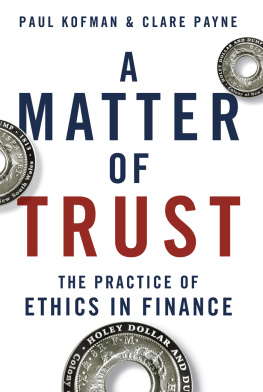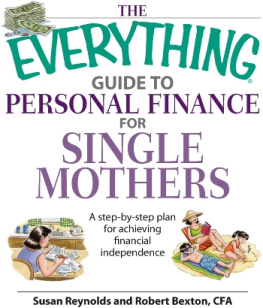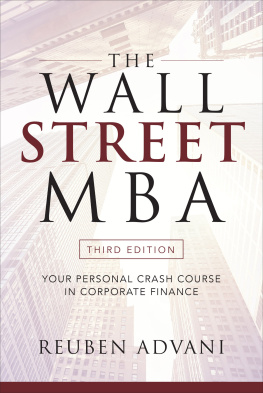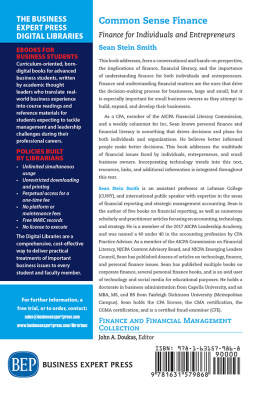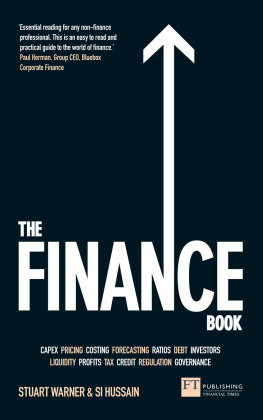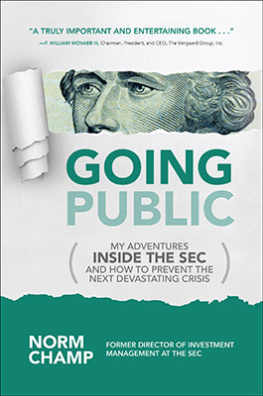Contents
Paul Kofman (PhD, Erasmus University Rotterdam) was appointed Professor of Finance at the University of Melbourne in 2001. In 2012, Professor Kofman became Dean of the Faculty of Business and Economics. Pauls research interests and publications are in quantitative and behavioural finance and the regulation of financial markets. He was one of the founding directors of the Australian Research Councilfunded Financial Integrity Research Network. With his colleague Clare Payne, Paul introduced one of the first online subjects at the University of Melbourne, Ethics in Finance. With his colleague Sean Pinder, Paul also designed and developed the first Coursera MOOC specialisation, Essentials of Corporate Financial Analysis and Decision Making, in partnership with BNY Mellon.
Clare Payne (BA LLB, Macquarie University) specialises in the field of ethics in business. She commenced her career as an employment lawyer and then managed the Integrity Office of a global investment bank. Clare was a founding director of The Banking and Finance Oath, a not-for-profit that advocates a Hippocratic-type oath for those in finance. Clare is also a Fellow of The Ethics Centre and an Ambassador for Tobacco Free Portfolios. Clare was awarded the Inaugural Ethics in Finance Prize by the Observatoire de la Finance, Geneva; is a World Economic Forum Young Global Leader; and has been recognised by the Australian Financial Review and Westpac as one of their 100 Women of Influence. As a former marathon swimmer, having swum solo around Manhattan, Clare has raised significant funds for the not-for-profit sector and continues to be actively involved in addressing a range of social issues.
A
MATTER
OF
TRUST
THE PRACTICE OF
ETHICS IN FINANCE
PAUL KOFMAN & CLARE PAYNE

MELBOURNE UNIVERSITY PRESS
An imprint of Melbourne University Publishing Limited
Level 1, 715 Swanston Street, Carlton, Victoria 3053, Australia
mup-info@unimelb.edu.au
www.mup.com.au
First published 2017
Text Paul Kofman and Clare Payne, 2017
Design and typography Melbourne University Publishing Limited, 2017
This book is copyright. Apart from any use permitted under the Copyright Act 1968 and subsequent amendments, no part may be reproduced, stored in a retrieval system or transmitted by any means or process whatsoever without the prior written permission of the publishers.
Every attempt has been made to locate the copyright holders for material quoted in this book. Any person or organisation that may have been overlooked or misattributed may contact the publisher.
Cover design by Design By Committee
Typeset by Megan Ellis
Printed in Australia by McPhersons Printing Group
National Library of Australia Cataloguing-in-Publication entry
Kofman, Paul, author.
A matter of trust: the practice of ethics in business/Paul Kofman, Clare Payne.
9780522871708 (paperback)
9780522871715 (ebook)
Includes index.
FinanceMoral and ethical aspects.
EconomicsMoral and ethical aspects.
Social responsibility of business.
Payne, Clare, author.
For those who need a little faith, or encouragement.
CONTENTS
FOREWORD
by Dr Simon Longstaff AO
Uncomfortable as it may be for those concerned, the medias focus on unethical conduct within banking and finance underlines the importance of the industry to society (and not just the economy). The truth is that public concern about the ethics of societys bankers reflects a general understanding of a simple fact: banking really matters. For centuries, and in the face of enduring controversy about issues like usury, banks (and associated financial institutions) have been meeting basic human needs. Insurance has enabled members of the community to spread the burden of risk. Credit has allowed individuals and organisations to invest in their dreams and the prospect of a better future. Savings facilities have allowed stable stores of wealth to be held safe. In combination, financial institutions have played a vital role in enabling prosperitynot just for the few but the many.
All of this has been built on a foundation of great private and public utility combined with trust. It was (and remains) an extraordinary thing that a promissory note written in Pisa could be presented half a world away, in London, with every expectation that it would be honoured. It is extraordinary that people will entrust a banker to receive and hold the bulk of their wealth, in the certain belief that it will be returned when called for.
The whole edifice of banking and finance has been built on a surprisingly fragile foundation of confidence. That is why the scandal is so great when bankers (and their institutions) are revealed to have acted in ways that betray trust. It matters not that the perpetrators are relatively few in number. It matters not that the majority of people in the industry feel just as betrayed as the hapless victims among their customers. When the foundations of trust are underminedeven just a littlethen the whole structure is rocked.
Of course, it does not help that the industry has often organised itself along lines that support (and sometimes drive) unethical behaviour. Remuneration policies, product design, a million small signals embedded in the ordinary structures of banking, have played their role in divorcing technical mastery from ethical restraint. For the most part, the adverse results have been unintended, often overseen by people of exemplary character and good will. But that is no excuse, and does not undo the great harm that offsets the considerable good to be found on the balance sheet of banking and finance.
Unfortunately, the industry (along with many others) ultimately has failed to understand that ethics is vastly different to compliance. The latter can be achieved in conditions of dumb obedience. The former requires much morethe development and maintenance of a culture in which every participant possesses and employs a constructively critical mindset. It requires leaders who never accept the status quo simply because everyone does it or because it has always been done this way.
To embrace reflective practice as part of what it means to be a banker requires both sound judgement and moral courage. This book makes the case for choosing to be that kind of bankerand how it should be given practical effect.
FOREWORD
by Greg Medcraft, Chairman, ASIC
Trust is a business asset. But building trust with customers has become far more challenging in the current environment, partly because the way in which customers interact with businesses has changed. Our commercial interactions are no longer, as they once were, with people we know directly. We now use digital technologies to transact, search for information, share our personal detailstaking a leap of trust that we are safe and our best interests are accounted for. These same digital technologies allow word-of-mouth and feedback to be magnified by social media, so customers can let businessesand the wider communityknow if they have met or exceeded expectations, but they will also let them know when they have crossed the trust line. Listening to the crowd and its messages through various channels requires a degree of accountability on the part of our institutions, and on our part as professionals.
As my term as Chairman of the Australian Securities & Investments Commission comes to a close, I reflect on how this book,

